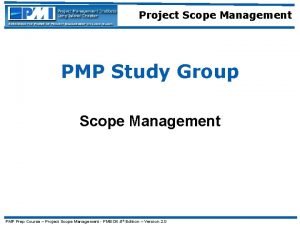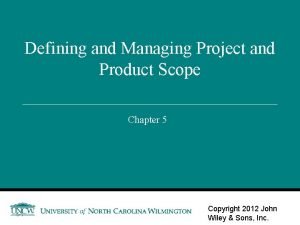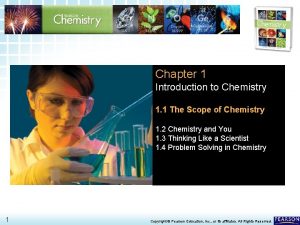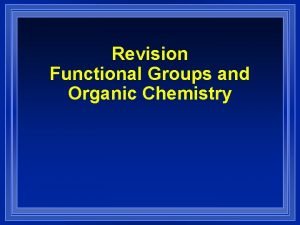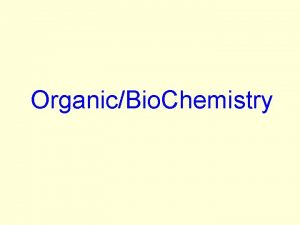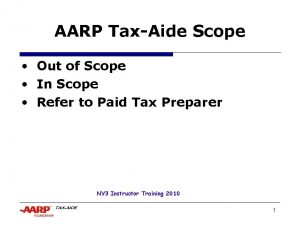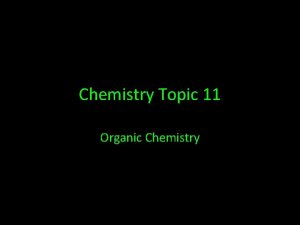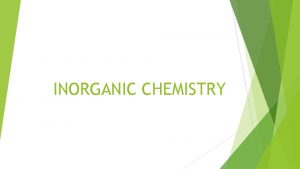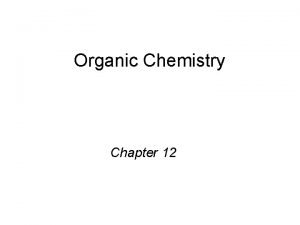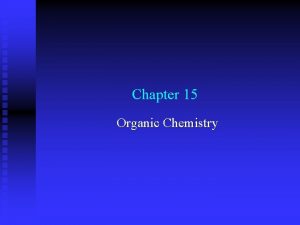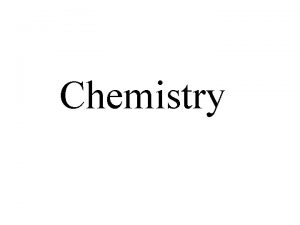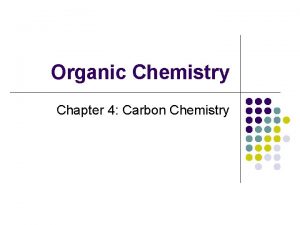1 1 The Scope of Chemistry Chapter 1
















- Slides: 16

1. 1 The Scope of Chemistry > Chapter 1 Introduction to Chemistry 1. 1 The Scope of Chemistry 1. 2 Chemistry and You 1. 3 Thinking Like a Scientist 1. 4 Problem Solving in Chemistry 1 Copyright © Pearson Education, Inc. , or its affiliates. All Rights Reserved.

1. 1 The Scope of Chemistry > What Is Chemistry? Matter is anything that has mass and occupies space. 2 Copyright © Pearson Education, Inc. , or its affiliates. All Rights Reserved.

1. 1 The Scope of Chemistry > What Is Chemistry? Matter is anything that has mass and occupies space. The trees, the water, and the buildings in the figure all examples of matter. 3 Copyright © Pearson Education, Inc. , or its affiliates. All Rights Reserved.

1. 1 The Scope of Chemistry > Areas of Study Five traditional areas of study are: • organic chemistry • inorganic chemistry • biochemistry • analytical chemistry • physical chemistry 4 Copyright © Pearson Education, Inc. , or its affiliates. All Rights Reserved.

1. 1 The Scope of Chemistry > Areas of Study Most chemicals found in organisms contain carbon. • Organic chemistry is defined as the study of all chemicals containing carbon. 5 Copyright © Pearson Education, Inc. , or its affiliates. All Rights Reserved.

1. 1 The Scope of Chemistry > Areas of Study The study of chemicals that, in general, do not contain carbon is called inorganic chemistry. 6 Copyright © Pearson Education, Inc. , or its affiliates. All Rights Reserved.

1. 1 The Scope of Chemistry > Areas of Study The study of chemicals that, in general, do not contain carbon is called inorganic chemistry. • Many inorganic chemicals are found in nonliving things, such as rocks. 7 Copyright © Pearson Education, Inc. , or its affiliates. All Rights Reserved.

1. 1 The Scope of Chemistry > Areas of Study The study of processes that take place in living organisms is biochemistry. 8 Copyright © Pearson Education, Inc. , or its affiliates. All Rights Reserved.

1. 1 The Scope of Chemistry > Areas of Study The study of processes that take place in living organisms is biochemistry. • These processes include muscle contraction and digestion. 9 Copyright © Pearson Education, Inc. , or its affiliates. All Rights Reserved.

1. 1 The Scope of Chemistry > Areas of Study The area of study that focuses on the composition of matter is analytical chemistry. 10 Copyright © Pearson Education, Inc. , or its affiliates. All Rights Reserved.

1. 1 The Scope of Chemistry > Areas of Study The area of study that focuses on the composition of matter is analytical chemistry. • A task that would fall into this area of chemistry is measuring the level of carbon dioxide in the atmosphere. 11 Copyright © Pearson Education, Inc. , or its affiliates. All Rights Reserved.

1. 1 The Scope of Chemistry > Areas of Study Physical chemistry is the area that deals with the mechanism, rate, and energy transfer that occurs when matter undergoes a change. 12 Copyright © Pearson Education, Inc. , or its affiliates. All Rights Reserved.

1. 1 The Scope of Chemistry > Areas of Study A physical chemist might study factors that affect the rate of photosynthesis in trees. 13 Copyright © Pearson Education, Inc. , or its affiliates. All Rights Reserved.

1. 1 The Scope of Chemistry > Areas of Study Pure chemistry is the pursuit of chemical knowledge for its own sake. 14 Copyright © Pearson Education, Inc. , or its affiliates. All Rights Reserved.

1. 1 The Scope of Chemistry > Glossary Terms • matter: anything that has mass and occupies space • chemistry: the study of the composition of matter and the changes that matter undergoes • organic chemistry: the study of compounds containing carbon • inorganic chemistry: the study of substances that, in general, do not contain carbon • biochemistry: the area of chemistry that focuses on processes that take place in organisms 15 Copyright © Pearson Education, Inc. , or its affiliates. All Rights Reserved.

1. 1 The Scope of Chemistry > Glossary Terms • analytical chemistry: the area of chemistry that focuses on the composition of matter • physical chemistry: the area of chemistry that deals with the mechanism, the rate, and the energy transfer that occurs when matter undergoes a change • pure chemistry: the pursuit of chemical knowledge for its own sake • applied chemistry: research that is directed toward a practical goal or application 16 Copyright © Pearson Education, Inc. , or its affiliates. All Rights Reserved.
 Product scope vs project scope
Product scope vs project scope Io2br3
Io2br3 The scope of chemistry
The scope of chemistry Scope of physical chemistry
Scope of physical chemistry Ib chemistry organic chemistry
Ib chemistry organic chemistry Organic vs inorganic chemistry
Organic vs inorganic chemistry Hình ảnh bộ gõ cơ thể búng tay
Hình ảnh bộ gõ cơ thể búng tay Frameset trong html5
Frameset trong html5 Bổ thể
Bổ thể Tỉ lệ cơ thể trẻ em
Tỉ lệ cơ thể trẻ em Chó sói
Chó sói Tư thế worms-breton
Tư thế worms-breton Bài hát chúa yêu trần thế alleluia
Bài hát chúa yêu trần thế alleluia Môn thể thao bắt đầu bằng từ chạy
Môn thể thao bắt đầu bằng từ chạy Thế nào là hệ số cao nhất
Thế nào là hệ số cao nhất Các châu lục và đại dương trên thế giới
Các châu lục và đại dương trên thế giới Công thức tiính động năng
Công thức tiính động năng
